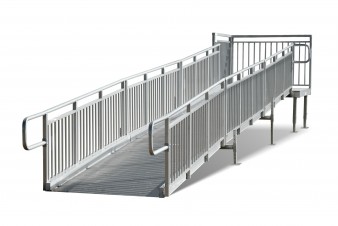When you need high-quality ADA-compliant aluminum wheelchair ramps and stairs to provide safe access to San Diego, California schools, REDD Team has the ideal solution. Our access systems are cost-effective, configured to meet your building code regulations, and designed for simple, painless installation.

REDD Team is a product brand of Hydro Extrusion North America, part of the world’s largest aluminum extrusion company. We manufacture high-quality aluminum access systems in the USA at Hydro’s Delhi, Louisiana extrusion facility. They are fabricated from 6000 series aluminum for structural strength and toughness.
REDD Team ramps and stairs are ADA-compliant and also compliant with the regulations of California’s Division of the State Architect (DSA), which governs the construction of buildings in California and promotes accessibility.
6000 Series Aluminum Alloys
What sets REDD Team’s access systems apart is our focus on the aluminum alloys we use in their construction.
Our Universal Wheelchair Ramp System is typically constructed from 6000 series aluminum alloy with 6061-T6 for structural strength. Handrails and guardrails are fabricated with aluminum construction alloy 6061-T6, 6063-T5 or 6063-T6.
6061 Alloy
6061 alloy is an outstanding substitute for mild steel products. It is tough, structurally strong, easy to weld and join, will keep its shape in spite of extreme cold or heat, and is highly resistant to rust and corrosion from environmental conditions.
6061 alloy is one of the least expensive and most versatile aluminum alloys. It gains strength from aging and thermal treatment. It conducts and dissipates heat well and, since it can be easily extruded, it can be formed into almost any imaginable shape.
6063 Alloy
6063 is one of the most popular alloys in the 6000 series. Depending upon its temper, the mechanical properties of 6063 aluminum can vary greatly. It has good extrudability and a high-quality surface finish, which makes it useful for a wide variety of applications from electrical components to architectural and building products. In its 6063-T6 heat treated condition, it is very resistant to corrosion and stress cracking. In its 6063-T5 condition, it offers slightly lower shear strength and ultimate tensile strength than 6063-T6
Aluminum Wheelchair Ramps vs. Wood Wheelchair Ramps
- Aluminum is much lighter than wood, which means that wheelchair ramps are easier to move or relocate.
- When powder-coated, aluminum requires no maintenance. Wood ramps and platforms must be repainted every few years.
- Wood may warp, rot, or splinter if not stored properly, and joints can become loose and wobbly.
- Wood shrinks and expands. Aluminum wheelchair ramps will maintain their shape and dimensions in spite of temperature extremes.
Aluminum Wheelchair Ramps Compared to Steel Wheelchair Ramps
- By volume, steel is three times heavier than aluminum and is more difficult to move.
- Aluminum’s natural oxide layer protects it from rust and corrosion. Steel has to be repainted or retreated every few years to keep it from rusting and corroding, especially in moist, damp or abrasive environments.
- Steel is a magnetic metal; aluminum is nonmagnetic.
- Steel is not as malleable or elastic as aluminum. Aluminum can be easily machined, cast, drawn, and extruded.
Aluminum wheelchair ramps are indispensable for students and other people with restricted mobility because they provide safe access to elevated and hard-to-reach areas. If you are looking for ADA- and DSA-compliant wheelchair ramps for schools in San Diego, California, contact REDD Team at (800) 648-3696 to learn more about our premium American-made Universal Wheelchair Ramp System.

